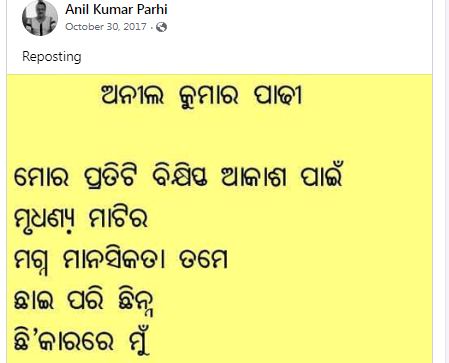How comfortable the Odia writers are in the realm of Facebook!

Thanks to Mark Zuckerberg, we find ourselves in a world where connectivity knows no bounds. In the grand theatre of existence, we can now share our joys, our sorrows, and our triumphs with friends, family, and acquaintances, irrespective of geographical constraints. Facebook has emerged as a global town square, engaging crores of people worldwide, guiding them away from potentially harmful or idle pursuits.

Imagine, for a moment, a world without the unifying force of Facebook. In the absence of this remarkable platform, countless souls might have strayed into the abyss of detrimental activities or frittered away their time on endeavors of little consequence. Zuckerberg’s creation has steered us clear of such perils, offering a virtual sanctuary where friendships and connections flourish.
An Era of digital mobility
Furthermore, we must acknowledge Zuckerberg’s role in ushering the era of digital mobility. Facebook has, in many ways, compelled individuals to have at least an Android mobile device with an internet connection, becoming the heartbeat of modern communication. This change has, undoubtedly, galvanized the mobile industry and internet providers, ensuring their continued growth and relevance.
Critics may raise concerns about the potential health hazards associated with excessive Facebook usage. However, it is essential to remember that the greater evils of alcoholism and malnutrition cast far darker shadows. Zuckerberg’s creation may have encouraged leisurely scrolling, but it is no match for the pervasive consequences of these age-old vices.
In fact, we may go so far as to assert that Zuckerberg has, in a subtle way, blessed us with a degree of laziness. For, as we while away the hours on Facebook, active people have the privilege of conserving their energy for meaningful pursuits. This idleness, like the virtue of forgetting, has its own place in the grand history of human existence.

Rise of social media platforms
In the ever-evolving space of modern communication, the rise of social media platforms has brought forth a confluence of opinions, preferences, and distinct societal divisions. A few years ago, the mention of Facebook was met with disapproving frowns and disdainful looks from some aristocratic circles, as they viewed it as a platform beneath their dignified stature. Even today, there are individuals who consider it derogatory to open an account on Facebook, instead preferring the allure of platforms like Instagram or Twitter.
Perhaps it is this very dichotomy that has contributed to Facebook’s enduring popularity and its status as a social medium meant for the common people. In the eyes of these critics, Facebook has become synonymous with accessibility, a virtual neighborhood where the commoner is free to wander, connect, and share their stories. It is a testament to the democratization of the digital space, where a diverse cross-section of society, from tech-savvy teenagers to seasoned professionals, finds a place for their voice to resonate.
Literary paradox
The juxtaposition of Facebook’s early perception and its contemporary ubiquity is akin to a literary paradox, one that resonates in the words of great Odia writers. In the initial stages of Facebook’s ascent, many of these literary luminaries vehemently voiced their apprehensions about the harm and cheapness that this platform might bring to society. They prophesied a grim future where Facebook would gradually erode the foundations of traditional media, casting ink and paper into the records of obsolescence.
Yet, time has a way of reshaping perspectives and transforming even the most resolute critics into enthusiastic participants. After a few years, a curious twist of fate occurred, as those very Odia writers, once wary of Facebook’s influence, began to embrace it with open arms. Today, they are some of the platform’s most ardent users, eloquently weaving their literary tapestries on this digital canvas.

Facebook skeptics
The transformation of these great Odia writers from Facebook skeptics to champions illustrates the adaptability of the human spirit in the face of societal change. It reflects the dynamism of social media and the profound impact it exerts on the cultural and intellectual landscape. Facebook, once the scorn of the elite, has transcended its humble beginnings to become an essential part of our modern narrative.
Facebook, once conceived as a digital album for showcasing our cherished photos, has transformed into an entity that transcends its initial purpose. While it is undeniable that Facebook still serves as a virtual gallery where our images garner the utmost attention, it has undergone a profound metamorphosis, emerging as the ubiquitous spokesperson for individuals across all walks of life. The social media behemoth has, in essence, evolved into a digital encyclopedia, encompassing a myriad of facets, from photos and videos to articles, stories, and the diverse spectrum of human opinions.
In its nascent stages, Facebook was conceived as a platform where individuals could create online profiles and share snapshots of their lives, thereby resembling a virtual photo album. It was the ideal platform for reminiscing about memorable vacations, special occasions, and personal milestones. Over time, however, it became apparent that Facebook was destined for a more comprehensive role in our lives.
True transformation
The true transformation of Facebook lay in its capacity to become the voice and visage of a multitude of actors, ranging from politicians with lofty ambitions to the humblest of marginal workers. It has, in a way, become the modern-day town square, a hub for discourse and representation. Politicians have harnessed its expansive reach to engage with constituents, share their ideologies, and campaign for office. Conversely, the marginalized worker, often unheard and unnoticed, can now tell their stories, share their struggles, and gain empathy and support from a global audience.
What is particularly striking about Facebook’s evolution is its assimilation of diverse forms of content. Photos, the platform’s original cornerstone, continue to capture the attention of users, but they now share the stage with videos, articles, stories, and opinions. Facebook has become the ultimate hub of multimedia expression, a platform where creativity knows no bounds. Users can tell their tales through captivating narratives, share knowledge throughv informative articles, and articulate their beliefs through impassioned opinions.
A reservoir of human stories
Furthermore, Facebook serves as a reservoir of human stories, a chronicle of our era. It encapsulates the joys and sorrows of individuals, preserving memories for generations to come. It captures the essence of social movements, political upheavals, and the ceaseless human quest for progress. In essence, it has become an indispensable repository of the human experience in the 21st century.
The allure of Facebook lies in its versatility. It is a canvas for self-expression, a pulpit for the articulate, and a bridge connecting individuals across geographical and cultural divides. It facilitates the exchange of ideas, fosters connections, and empowers individuals to be part of a global conversation. Photos may still be at the heart of Facebook’s charm, but it is the amalgamation of all these elements that defines its contemporary significance.

In the vast realm of Facebook, where countless digital scrolls unroll with every swipe, one can move on a journey through the endless network of human expression and connection. Amidst the digital cacophony, snuggled within the vast canvas of human stories and sentiments, one discovers an unexpected treasure trove – the fusion of Facebook and Odia Literature.
The new Odia literary world
For the literary aficionado, Facebook is akin to an expansive library, where pages upon pages unfurl with the eloquent strokes of the Odia literary world. It’s as if, by simply turning the pages of this virtual repository, one can move through a portal that encapsulates 90 percent of literary postings. This digital stage is where the essence of Odia literature is vividly portrayed.
The diverse facets of Odia literature are illuminated here, not as mere words on a static page but as a dynamic pattern. It includes mesmerizing videos of poets reciting their Odia verses, a digital celebration of literary programs, and even the poignant milestones in the lives of writers and their loved ones – marriages, and death anniversaries. In these moments, Facebook becomes a poetic canvas on which the colors of life and art blend seamlessly.
Writers, it seems, find a stage to manifest their multiple talents on this social platform. They sing, they act, they go on picnics, and they engage in intriguing interviews that unveil the minds behind the words. In this digital realm, they are not confined to the pen and paper but take flight in diverse forms.
Two categories of writers
Yet, a unique dichotomy emerges within this literary haven. There exist two distinct categories of writers in Facebook – the ‘Facebook Writers’ and the ‘Writers’ Facebook.’ A chasm separates these two groups, marked not just by nomenclature but by a divergence in their literary destinies.
The ‘Facebook Writers’ form a passionate cohort. They find joy in the virtual realm of Facebook, their works unfurling upon the timelines of their followers, the essence of their creative souls confined to these digital borders. Their words may not grace the glossy pages of prestigious magazines, but they share their deepest thoughts and musings, encapsulating the very spirit of unfettered creativity.
On the other side of this literary divide are the ‘Writers’ Facebook.’ Their narratives might find their way into the traditional pages of established magazines. Here, they write not only to satiate their passion for expression but also to bask in the glory of literary acclaim. Their Facebook posts serve dual purposes – to engage with their loyal readers and to garner the admiration of their literary peers.
My experience
It was in the year 2016 that I ventured into the captivating, and sometimes treacherous, landscape of Facebook. Little did I know that this seemingly innocuous step would lead to an unexpected clash of ideas and values with one of my dearest family friends.
In retrospect, the skirmish was my own doing, a result of my initial naiveté in navigating the uncharted waters of social media. Facebook, for me, was an enigma waiting to be deciphered. I stumbled upon it like a novice in an unfamiliar realm. The rules of engagement eluded me, and my dear friend’s reprimand was an awakening, a moment when I realized that this digital domain required a different set of sensibilities and etiquette.

Yet, as is often the case with beginners, I learned gradually. Friends became my guides, introducing me to the nuances of this virtual world. I discovered that Facebook was not merely a platform for sharing cat videos and vacation photos; it was a vast stage where voices resonated with opinions, emotions, and creativity. Slowly but surely, I found my footing, embracing Facebook as an extension of my literary pursuits.
Today, I find myself straddling the divide between being a writer for magazines and a writer on Facebook. This duality is not a mere coincidence but a conscious choice. Facebook has become, for me, no less than a printed page. The words I craft and share here are as significant as those that grace the pages of traditional magazines.
To me, there’s little distinction between the digital and the written page. The narrative woven on Facebook holds the same weight as one inked on paper. In fact, I dare say that I find Facebook more convenient than traditional magazines. The immediacy of the platform offers a powerful advantage. As a writer, I no longer need to wait for the painstaking process of selection and publication that magazines entail.
Instant gratification
Facebook is the realm of instant gratification. The feedback from readers is swift, unfiltered, and raw. It’s a canvas where I can unfurl my thoughts without constraints, and it’s the audience’s immediate responses that inspire me to continue weaving my literary pursuit.There’s a sense of freedom in Facebook’s vast expanse. Here, a writer can express thoughts, ideas, and stories without inhibition, unburdened by the traditional editorial gatekeepers.
In the duality of my writing life, I have found equilibrium. The magazine pages and Facebook posts coexist harmoniously. They are not two separate worlds, but two facets of the same literary journey. Facebook, in all its digital glory, has enriched my writing experience, making it more immediate, more interactive, and ultimately more rewarding.
In the ever-expansive realm of literary expression, where the written word dances upon the digital stage of Facebook, a curious dichotomy emerges – a division of literature into two distinct spheres, the splendid and the somewhat less so. This demarcation is not one ordained by a council of literary sages but a consequence of the evolving landscape of online creativity, particularly within the context of Odia writers and their works.

A vibrant sphere
In the vibrant sphere of Facebook, writers are given a digital canvas upon which they may sketch their literary musings. Yet, it is within this domain that a peculiar phenomenon unfolds, a phenomenon I have come to discern as the premature birth of writers. Eager to bask in the immediate glow of popularity, these writers share their compositions with the world, posting their words with an alacrity that astounds. In a few fleeting months, these posts coalesce into a book, a collection of Facebook musings. Such a practice raises an interesting question – does the desire for immediate fame supersede the commitment to nurturing one’s craft?
The other facet of this literary panorama is occupied by those who approach their art with unwavering seriousness, irrespective of the platform – be it in the pages of a magazine or on the digital universe of Facebook. These dedicated wordsmiths, ever vigilant about the quality and essence of their writing, treat each piece with the reverence it deserves. To them, the words they craft are not merely pixels on a screen but the embodiment of their artistic souls.
A noteworthy irony emerges when comparing the recognition garnered by these two categories. It is a paradox where, seemingly, the less exquisite writings amass an army of likes and comments, while the genuinely good ones find themselves echoing in the caverns of obscurity. Such a revelation can be disheartening for a writer, as it strikes at the core of their artistic ego. I, too, once found myself ensnared by this allure of social validation. However, as the seasons of experience unfolded before me, I began to unravel the truth that lies beneath the glossy veneer of Facebook’s likes and comments.
It is a revelation that dawns as we scrutinize the very nature of Facebook’s readership. In this digital realm, the ‘like’ button becomes a matter of mere reflex, pressed without discrimination or comprehension. Comments, often effusive and laden with praise, are offered as tokens of camaraderie rather than genuine critique. The harsh truth emerges – the readership of Facebook is seldom driven by a desire to truly engage with the written word. Instead, it seems that most are aspiring writers in their own right, seeking the same fleeting moment of adulation.
Grand theatre
In the grand theater of Facebook, the performance is more about the players than the script itself. It is a world where everyone desires to wield the pen and ink, but few aspire to be the true connoisseur of literature. In this whirlwind of digital creation, the line between writer and reader blurs, and the pursuit of literary excellence often becomes entangled with the quest for online popularity. It is a world of its own, replete with paradoxes and dilemmas, where the definition of ‘good’ and ‘not so good’ remains in the eye of the beholder.
True that the advent of platforms like Facebook has sparked a debate, with some asserting that no discerning editor exists in this vast virtual library. They argue that, in contrast, literary editors meticulously curate the content in their magazines. But is it a selection based on merit, or does it depend on the writers’ social standing?
The truth, it seems, lies in a paradox. Both in magazines and on Facebook, the notion of selection is elusive. As the people of Odisha, a land steeped in culture, increasingly aspire to be writers, the inevitable outcome is the exploitation of the majority. Yet, in Facebook’s realm, there is a silver lining – it doesn’t exploit writers.
A rapid surge
Critics argue that Facebook’s influence has led to a rapid surge in the number of writers in Odisha. This writing trend, I believe, gained momentum around the year 2000. Those who couldn’t find their footing in other fields sought solace and social standing in literature. The paradox is that these dreamers fail to realize that, apart from a privileged few, others are often looked down upon.
A swarm of writers takes to the skies of Facebook with unwavering enthusiasm, their voices sometimes descending into absurdity. Most of them, it seems, are drawn to poetry. They ingest verses, slumber in stanzas, and breathe in rhymes. Even the simplest information is presented in poetic fashion. This inclination, however, can be disconcerting.
The poetic deluge, while a testament to the creative spirit of Odisha, may dilute the essence of the written word. It’s vital to strike a balance between encouraging literary expression and maintaining the integrity of the art.
The interaction between literary masters and the budding talents of Odia literature on Facebook is akin to a bridge connecting generations. Gone are the days when fear and hesitation plagued the young Odia writers, who once stood in awe of their idols. Facebook has erased the intimidating distance, offering them a direct line to their literary heroes. This proximity has acted as a catalyst for inspiration and a treasure trove of knowledge.
Undoubtedly, Facebook has established itself as one of the finest platforms for Odia writers to express themselves. However, in the pursuit of this digital utopia, a modicum of restraint is essential. Before unveiling a piece of writing on their virtual wall, a writer must exercise due diligence. This process begins with introspection and critical self-examination, a thorough scrutiny of one’s work, and most importantly, rewriting.
Rewriting is the linchpin of literary refinement. It is through this process that the rough edges are polished, the obscure thoughts are clarified, and the writer’s voice becomes more resounding. It is here that the true essence of Odia literature takes shape.
Thanks a ton sir that you have made it more readable.
Anil Kumar Parhi
It’s beautifully put. Thanks to Anil.
Thanks
A must read analysis of recent social media arena.Thanks Anil sir for presenting such a precious write up.